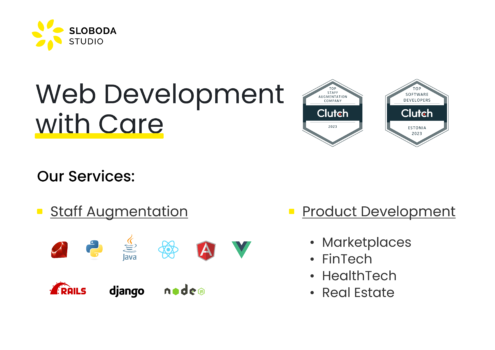In this article, we’ll help you find the ideal Ruby on Rails development company for your startup. From understanding the critical factors in partner selection to conducting thorough research and due diligence, this article will equip you with the knowledge and strategies needed to make a well-informed decision.
Let’s explore the steps, challenges, and solutions that will pave the way for a fruitful partnership and set your startup on the path to triumph.
The Significance of Selecting the Ideal Ruby on Rails Development Partner for Your Startup
Launching a startup is an exciting endeavor that requires careful planning and strategic decision-making. One of the most critical choices you’ll make is selecting the right Ruby on Rails development partner.
This decision holds immense importance for the success and future of your venture. Here are the key reasons why finding the perfect development partner is crucial:
Technical Expertise
A skilled Ruby on Rails development partner brings a wealth of technical expertise to the table. Their proficiency in the framework ensures that your startup’s application is built efficiently, with clean, maintainable code.
Efficient Development Process
The right partner will have a streamlined development process in place. This means that your project will progress smoothly, with clear milestones and timely deliveries.
Problem Solving and Innovation
A proficient development partner can offer valuable insights and creative solutions to complex challenges. Their experience and problem-solving abilities can significantly enhance the quality and functionality of your application.
Scalability and Future-Proofing
A capable partner understands the importance of scalability. They will build a foundation that allows your application to grow and adapt as your startup expands, saving you time and resources in the long run.
Risk Mitigation
Collaborating with an experienced development partner minimizes risks associated with technical hiccups, missed deadlines, and subpar code quality. Their expertise provides a safety net, ensuring that your project stays on track.
Choosing a Ruby on Rails Development Partner
When it comes to choosing a Ruby on Rails development partner, it’s essential to consider various factors and weigh different options. Here are some important factors to keep in mind:
Technical Expertise
Look for partners with a deep understanding of Ruby on Rails and a proven track record of successful projects.
Communication Skills
Effective communication is crucial for a smooth development process. Ensure that the partner can articulate ideas and respond promptly.
Cultural Fit
It’s important to find a partner whose work culture and values align with your startup’s vision.
Types of Development Partners
Decide between hiring freelancers or engaging a development agency. Freelancers offer flexibility and cost-effectiveness, while agencies provide a broader range of skills and resources.
Onshore vs. Offshore
Consider whether you want a partner located in your country (onshore) or in a different country (offshore). This decision involves factors like cost, time zone differences, and language barriers.
Have a checklist of what you require and assess your shortlist of partners against it. For example, the multi-national agency Sloboda Studio seems to have all of the boxes checked. With over 13 years of experience, that team is capable of working with customers all over the world, tuning into their time zones. They have a senior team with average B2 English, so communication will never be a problem. As for Ruby on Rails, they were founded initially as a Rails agency so they’ve been building and scaling Rails applications for over a decade.

Research and Due Diligence
To illustrate effective research and due diligence, let’s consider two real examples:
Example 1: Recommendations and Portfolio Review
Start by seeking recommendations from industry peers. Additionally, explore online platforms and review portfolios of potential partners. For instance, a startup in the e-commerce sector might approach a partner recommended for their expertise in building robust online marketplaces.
Example 2: Interview Questions
During interviews with potential partners, ask questions such as:
– “Can you describe your approach to project management and how you handle unforeseen challenges?”
– “What is your experience with integrating third-party APIs in Ruby on Rails applications?”
Asking specific questions tailored to your startup’s needs can provide valuable insights into a partner’s capabilities and compatibility.
Making the Final Decision
After gathering information from potential partners, it’s time to evaluate their proposals, quotes, and contracts. For instance, if you are focused on developing a social networking platform you may compare proposals in terms of features, scalability options, and estimated timeframes.
Finalise terms and agreements to ensure both parties are aligned on expectations, responsibilities, and outcomes.
Onboarding and Collaboration
Effective Communication Channels
Establishing effective communication channels is crucial. Utilise project management tools like Trello or Slack, and schedule regular video meetings. This approach ensures that everyone stays informed and aligned throughout the development process.
Project Milestones and Timelines
Define clear project milestones and timelines. For example, a startup creating a scheduling app might set milestones for feature development, beta testing, and final launch. Regularly review and adjust these milestones as needed.
Common Challenges and Solutions
Scaling the Development Team
As your startup grows, you may need to scale your development team. Consider implementing agile methodologies and exploring options like hiring additional developers or bringing in specialised expertise as needed.
Addressing Scope Changes
In a dynamic startup environment, scope changes are inevitable. Implement a process for addressing these challenges. For example, document change requests and assess their impact on timelines and resources.
Managing Cultural and Language Differences
When working with offshore partners, foster an inclusive environment. Provide clear documentation and schedule regular check-ins to bridge any cultural and language gaps. In Sloboda Studio, clear communication will help you establish fast and efficient collaboration via consulting services and transparent interviews.
Ensuring Code Quality and Security
Maintaining high code quality and ensuring security is crucial for the success of any project. Conduct regular code reviews and implement automated testing processes. Additionally, consider leveraging security tools and best practices to safeguard your application.
Selecting the perfect Ruby on Rails development partner for your startup is a pivotal decision that requires careful consideration and due diligence. By following the steps outlined in this article and considering real examples, you can navigate the process with confidence, ultimately setting your startup on a path to success with a trusted and capable development partner by your side.

